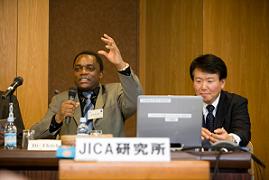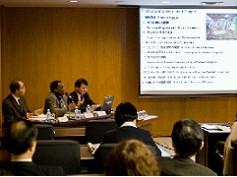JICA-ODI Joint Seminar "Challenges of OVOP Movement in Sub-Saharan Africa"
2009.03.23
JICA-RI and the Overseas Development Institute (ODI) of the U.K. co-hosted a seminar December 11, 2008 at the JICA-RI building to report on progress of their comparative study of the One Village One Product (OVOP) movement in Thailand, Malawi and Japan.
OVOP first took root in Oita Prefecture, Japan, in the late 1970s as a measure for revitalizing the local economy. The movement has now spread to more than 12 countries in Asia and Africa under the three principles of "local yet global," "self-reliance and creativity" and "human-resource development."

JICA-RI's Mr. Kiyoto Kurokawa and ODI's Dr. Fletcher Tembo have been collaborating since 2007 on a comparative study of Thailand, Malawi and Japan's Oita to identify the particular characteristics of the OVOP movement in each. The primary objective of their research is to understand the implications for effective OVOP expansion in Sub-Saharan Africa.

Dr. Tembo, a native of Malawi who earned his Ph.D in the U.K., attended the seminar having just returned from his first trip to Beppu, Yufuin, Ajimu and Oyama towns in Oita. He had communicated with OVOP founder and former governor of Oita Prefecture Mr. Morihiko Hiramatsu and studied the small-and-medium-enterprise development, eco-tourism, roadside stations and Handcraft Center there. Dr. Tembo stressed that the most significant aspect of the OVOP movement is that it stimulates people's creativity to add value to local resources. He has become convinced that any product or service has the potential to be profitable, a possibility that will greatly motivate the African people.
Dr. Tembo described the characteristics of OVOP in Malawi as distinctly government-led, unlike the endogenous movement in Japan. The Malawi OVOP started with the foundation of the National Secretariat in 2003, supported by foreign donations to provide microfinance. He explained that there is a need now for government intervention, empowerment of rural co-ops and decentralization that will improve product quality in each participating community.
Mr. Kurokawa gave a presentation on Thailand's One Tambon ('Village' in Thai) One Product, which, like OVOP in Malawi, is characterized by a strong government initiative. Since 2000 OTOP in Thailand has yielded many quality products, and its logo is widely recognized by the Thai people as a mark of quality. Mr. Kurokawa stressed that OTOP decentralization is important also in Thailand to combat poverty.
The response of the seminar participants to the presentation was quite positive. The Japanese government already has announced its commitment to OVOP expansion in Africa. The JICA-ODI joint research is expected to increase field analysis and clarify policy implications for the continent. The final paper from this comparative study will be completed by the end of March 2009.

事業事前評価表(地球規模課題対応国際科学技術協力(SATREPS)).国際協力機構 地球環境部 . 防災第一チーム. 1.案件名.国 名: フィリピン共和国.

事業事前評価表(地球規模課題対応国際科学技術協力(SATREPS)).国際協力機構 地球環境部 . 防災第一チーム. 1.案件名.国 名: フィリピン共和国.

事業事前評価表(地球規模課題対応国際科学技術協力(SATREPS)).国際協力機構 地球環境部 . 防災第一チーム. 1.案件名.国 名: フィリピン共和国.

事業事前評価表(地球規模課題対応国際科学技術協力(SATREPS)).国際協力機構 地球環境部 . 防災第一チーム. 1.案件名.国 名: フィリピン共和国.

事業事前評価表(地球規模課題対応国際科学技術協力(SATREPS)).国際協力機構 地球環境部 . 防災第一チーム. 1.案件名.国 名: フィリピン共和国.
scroll